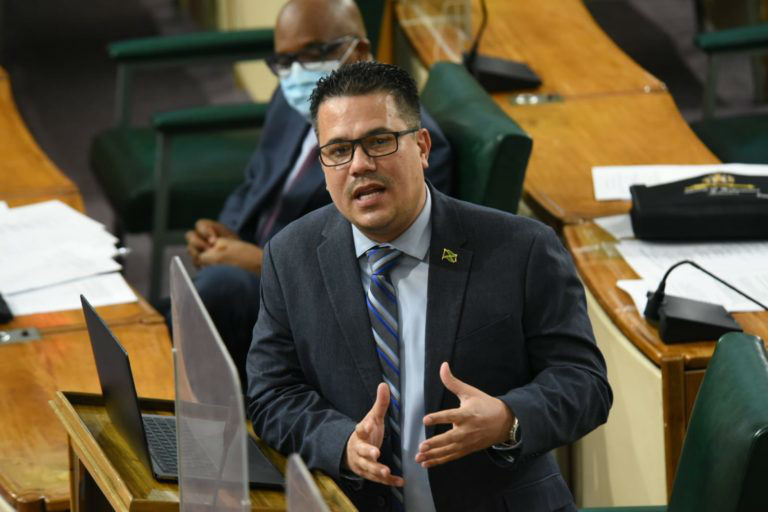Jamaica’s prosperity paradox can only be solved by protecting its natural assets – Samuda
Senator the Hon. Matthew Samuda, Minister without Portfolio in the Ministry of Economic Growth and Job Creation, has stated that the prosperity paradox which has faced Jamaica for the better part of 50 years can only truly be solved by ensuring the appropriate use, management and protection of the island’s Natural Assets.
Making his contribution to the Debate on the Appropriations Act in the Senate recently, Minister Samuda highlighted some of the work being done in the Environment Portfolio and shared plans for the upcoming fiscal year, among them Jamaica’s membership in the thirty by thirty (30×30) Coalition.
“This means that Jamaica is actively pursuing both the protection of 30% of its landmass and 30% of its fresh and sea water (within its EEZ) by 2030. This work is being undertaken by the teams at NEPA, and the Forestry Department while being coordinated by the Environment team at MEGJC. These targets reflect Jamaica’s articulated ambition to double the targets currently agreed on by UNEP of 15%”, Minister Samuda shared.
Minister Samuda added that the Convention on Biological Diversity, to which Jamaica is a party, defines a protected area as ‘a clearly defined geographical space, recognized, dedicated and managed through legal or other effective means, to achieve the long-term conservation of nature with associated ecosystem services and cultural values.’
In furtherance of this, the Minister noted, two major achievements of the Government over the last fiscal year were the Black River Protected Area in St. Elizabeth, which he noted will preserve the natural and cultural heritage of the area including swamp forest, mangroves, beaches and coral reefs, which support wildlife and sustainable livelihoods.
The second area he mentioned, was the completion of the work to declare the Cockpit country a protected area.
“78,024 hectares are now protected. This represents the second largest protected area in Jamaica, and is approximately 3292 hectares larger than the announced 74,726 hectares which was announced in 2017. Now that it has been declared, the CCPA is the island’s largest terrestrial protected area and overall, the second largest protected area after the Portland Bight Protected Area which is located in the south-central part of the island spanning 187,615 hectares of both terrestrial and marine areas. We did not stop there. We have further included an additional 841 hectares of the “clawed back” area of mining lease within the boundary of the CCPA. That is how we have arrived at the final protected area of 78,024 hectares”, the Minister noted.
Minister Samuda also disclosed that with the assistance of the Global Environment Fund, work is advanced to invest US$49 million over the course of the next 5 years into the sustainable management of the protected area.
As the Government moves to actualize Jamaica’s 30 x 30 ambition over the next financial year, the Minister advised that one of the major areas of focus in the next financial year will be protection of the Pedro Cays and the surrounding waters, adding that work in this area is far advanced, and will result in the protection of some 88,200 hectares of land and sea. He also disclosed that the Government will move to create a Designation under the NRCA act for “Ecologically Sensitive Areas”.
“This will provide a greater level of protection for areas with particular environmental sensitivities. The Government has already identified 16 such areas, 9 of which will be in the coastal zone. I think it useful to advise the Senate, and indeed the country that the first such area will be the Great Bay Area in South-West St Elizabeth. The Dry Harbour area will be another such area. This will mean that Activities such as mining will not be permissible”, he said.
Turning to plastic pollution, Minister Samuda noted that a resolution was passed recently in Nairobi, Kenya, by the UN Environment Assembly with 175 Nations supporting the establishment of an International Negotiating Committee to help develop a globally binding treaty on the issue.
“Mr. President, this treaty could have major implications to our manufacturing sector as it seeks to re-order our consumption patterns and change our management of plastic waste. As such, I’ve been directed to formally engage the Private Sector to ensure that they are properly advised and prepared for the changes to come” the Minister stated.
Minister Samuda added that in the interim, the Ministry of Economic Growth & Job Creation along with NEPA will take steps to maintain Jamaica’s leadership in this area. This he said, includes a full review of the measures already in place; a recommittal to enforcement of these measures; a full review of the current recycling capacity in partnership with the NSWMA with the aim of moving plastic recycling targets to 50% of monthly consumption, up from the current 12% being achieved.
The government, the Minister said, would also move apace to tighten loopholes in the current phased ban with a view to adding other items to the prohibition list this year, including the banning of personal care products which contain micro-plastics. He noted that government would also work with the Bureau of Standards to ensure completion of the standards for Biodegradability.


